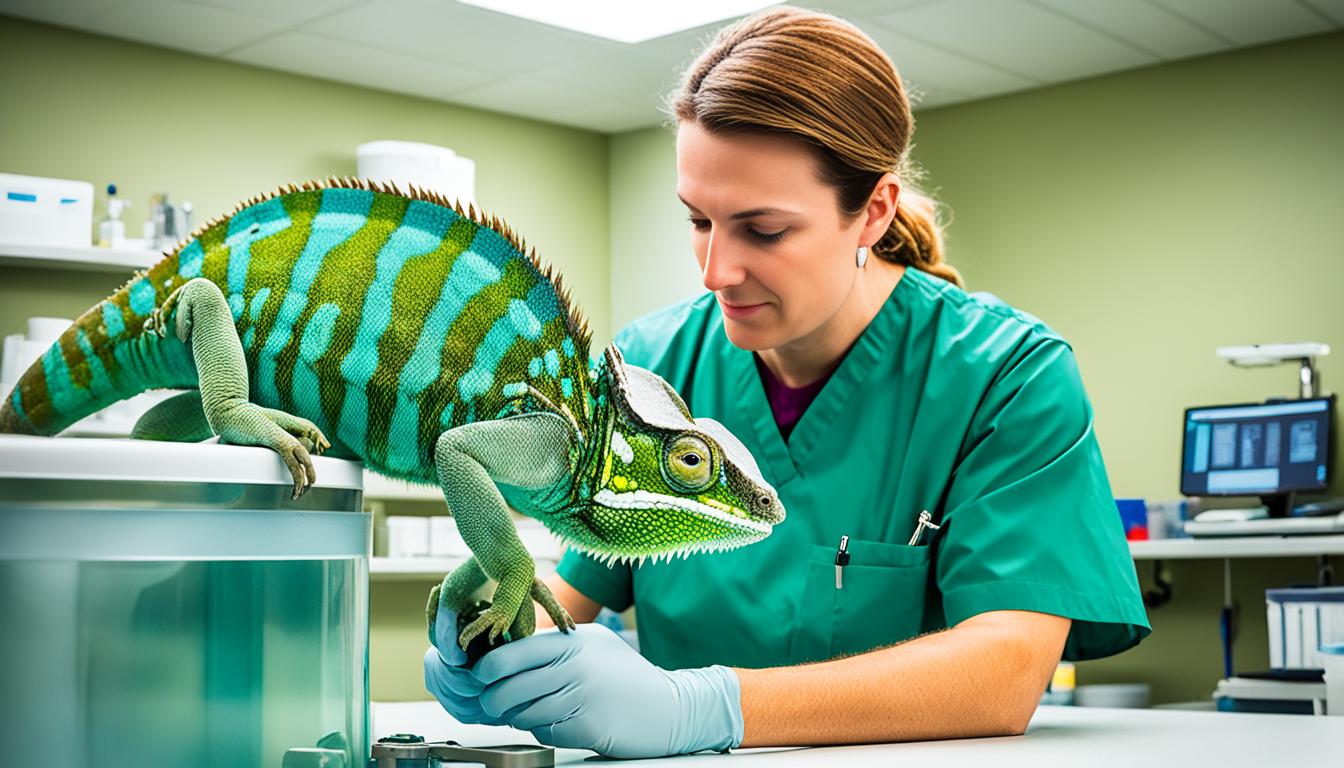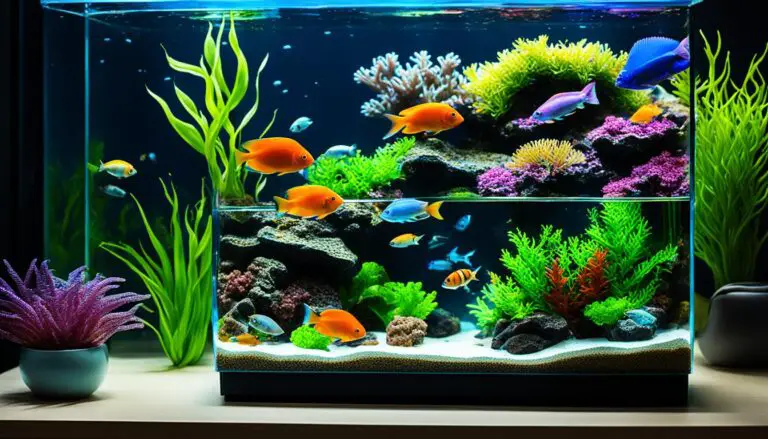Exotic Pet Veterinary Care Essentials Guide
Inadequate care is a big reason for illness and death in exotic pets. It’s crucial to understand what each kind of exotic animal needs for their health and happiness. Whether it’s a reptile, bird, rodent, or amphibian, the right care is key. For the best care of your exotic friend, working with a vet who knows exotic pets is the first step.
Key Takeaways:
- Proper care is essential for the health and well-being of exotic pets.
- Inadequate care can lead to illness and death in exotic pets.
- Partnering with a specialist exotic pet vet is highly recommended.
- Exotic pets include rodents, rabbits, ferrets, reptiles, amphibians, and birds.
What is an Exotic Pet?
An exotic pet is a species not common in homes, unlike cats and dogs. This group includes small mammals, reptiles, amphibians, and birds. Each type needs its own special care.
Small mammals, like ferrets and rabbits, are a hit for someone wanting a unique friend. They need special diets and living conditions.
Reptiles, such as snakes and lizards, make interesting pets. They need special places to live with right heat and light. Owners should learn a lot about them.
Amphibians, which are frogs and salamanders, love certain places to live. They thrive with the correct humidity levels and water and land space. Making the perfect home is key for their health.
Birds like parrots and cockatiels make homes happier. Owners must give them good food, a nice place to live, and things to keep them busy. This helps the birds act naturally and not get bored.
Knowing how each exotic pet type is different lets owners care better for them. This includes small mammals, reptiles, amphibians, or birds. The right care is vital for their happiness.

Exotic Pet Handling and Restraint
Handling exotic pets right is key to keeping them safe and happy. These animals are different from regular pets in how they act, feel, and look. So, they need special care.
It’s common for exotic pets to get hurt during handling. If not done carefully, they get scared and can be harmed. It’s really important to be careful and use the right ways to hold them.
Checking them over is also vital. Doing this lets you make sure they’re okay, see if they’re sick or hurt, and fix any problems fast. Look out for anything unusual on their bodies or in their behavior.
Exotic pets sometimes need their nails trimmed. Long nails can hurt them, make it hard to walk, and even cause wounds. But cutting their nails needs care and the right skills. A vet or an expert on your pet’s type can teach you how to trim nails safely.
There are special ways to do tasks like picking them up or doing basic care. Knowing these ways helps keep both you and the pet from getting hurt. Getting advice from someone experienced in exotic pets is a great idea.
“Handling exotic pets requires a mix of knowing what you’re doing, being gentle, and being confident. Always remember to treat them with care and make them feel safe and at ease when you’re caring for them.”
– Dr. Emily Wilson, Exotic Pet Specialist

Remember: use the right handling methods, check them over often, and trim their nails correctly. This way, you’ll keep your exotic pet happy and healthy.
Exotic Pet Housing and Environment
Creating a good home for your exotic pet is key to their well-being. A comfy and safe space helps your pet to be happy and healthy. Consider these key points for their living area:
Enclosure Location and Safety
Where you put the enclosure is very important for your pet’s comfort and safety. Pick a calm spot away from wind, loud areas, and direct sun. This choice helps your pet relax and avoid stress. A secure enclosure is vital, especially for tiny pets like rodents or reptiles.
Climate Control
The inside climate needs to be right for your pet’s good health. Different pets need specific temperatures and humidity. Research what your pet needs and get the right tools to control the temperature and humidity. Make sure there’s a variety of temperatures in the enclosure so your pet can choose what’s best for them.
Bedding Selection and Hygiene
Choosing the best bedding is crucial for your pet’s comfort and keeps things clean. You can use shredded paper, reptile carpet, or specific bedding. It’s vital that the bedding is safe, easy to clean, and helps keep the right moisture levels. Clean and change the bedding often to stop any bad smells or health hazards.
Access to Resources
Think about what your exotic pet needs in their home. Make sure they have places to hide, climb, or explore. These things make their space more like their natural home and keep them active and happy. Don’t forget fresh water, feeding spots, and the right food bowls for their health.
By making the right living space and environment, your exotic pet can have a great life. Keep checking the enclosure and how your pet acts. Also, getting advice from a vet who knows about exotic pets is a good idea. They can help make sure you’re doing everything your pet needs.
| Factors to Consider | Details |
|---|---|
| Enclosure Location and Safety | Choose a quiet, draft-free area for the enclosure and ensure it is escape-proof. |
| Climate Control | Regulate temperature and humidity based on the species’ requirements. |
| Bedding Selection and Hygiene | Select non-toxic bedding materials and regularly clean and replace them. |
| Access to Resources | Provide appropriate hiding spots, climbing structures, and feeding stations. |

Setting up a comfy and safe place is crucial for your exotic pet’s welfare. Think about what they need and get the right tools for the job. Always keep an eye on their living space to keep them healthy and happy.
Exotic Pet Nutrition and Diet
For exotic pets, getting the right nutrition is key for their health. Each type of exotic pet needs its special diet. This diet should be like what they would eat in the wild. It helps them stay healthy and get the nutrients they need.
Every kind of exotic pet likes different foods. Reptiles need a lot of protein. On the other hand, rabbits and rodents need lots of fiber. Birds like a mix of fresh foods, seeds, and pellets.
Using ready-made pet foods can sometimes be okay. But, some exotic pets need fresh food, live prey, or special supplements. A vet with knowledge about exotic pets can help you figure out the best diet for your pet.
When planning your exotic pet’s diet, aim for balance. A well-balanced diet gives your pet all the nutrients it needs. It means getting the right amounts of proteins, carbs, fats, and more. Your vet can help you create a diet that’s just right for your pet.
Keeping food safe is also vital for exotic pets. Make sure to offer fresh and clean food. Don’t give them old or bad food. Save and handle food the right way to keep it fresh and safe.

| Exotic Pet | Preferred Diet |
|---|---|
| Reptiles | Protein-rich diet, including insects, rodents, and vegetables |
| Small Mammals | High-fiber diet, including hay, vegetables, and limited amounts of fruits |
| Avian Pets | Variety of fruits, vegetables, seeds, and pellets |
| Amphibians | Insects, worms, and specific amphibian food |
Always remember, giving your exotic pet the right diet is crucial. Talk to a vet who knows about exotic pets. They can make sure you’re taking care of your pet’s nutritional needs and help with any diet questions.
Exotic Pet Enrichment and Wellbeing
Enrichment is key for exotic pets’ physical and emotional health. It includes activities that let them act like they would in the wild. This improves their life quality.
Toys are a great way to enrich exotic pets’ lives. They stimulate the pets’ minds and senses. Ensure toys are safe for your friend and fit for their type. For instance, reptiles might enjoy puzzle feeders. Birds might like toys that make them solve problems or find food.
It’s also crucial to have the right structures in their home. Climbing frames, hiding spots, and perches can be fun and good exercise. Make sure they resemble the pets’ natural living space, so they can act like they would in the wild.
Some exotic pets need friends for their wellbeing. It depends on the species. If you think your pet might need a buddy, ask a vet or an expert. They can tell you if it’s a good idea and how to do it safely.
Challenging your exotic pet in safe ways is also important. You can create games, use new scents and materials, or change their diet in a way that makes them work for their food. This keeps them healthy and happy by letting them behave naturally.
Remember, each exotic pet is different. It’s always a good idea to learn about what your pet specifically needs. A vet who knows about exotic animals can be a great help. They can make sure your pet is getting the best care and enrichment possible.
Exotic Pet Veterinary Care Requirements
Exotic pets need regular check-ups to stay healthy, just like cats and dogs do. Special care ensures their health and happiness.
Wellness exams are key for exotic pets. During these, a vet checks your pet’s health, finds issues early, and gives vaccines. This means problems can be fixed before they get worse.
Blood work is also important for these pets. It shows the vet what’s going on inside, catching hidden health problems. This insight helps the vet care for your pet better.
Exotic pets should also have screenings for parasites. These tests look for things like worms and fleas. Catching and treating them early avoids serious health troubles for your pet.
If your exotic pet seems off, like not eating well or acting strange, call a vet right away. Quick care can really help their health.
Regular care, including check-ups, blood work, and parasite checks, is crucial for exotic pets. It keeps them healthy, so you can enjoy them for many years.
Importance of Regular Check-Ups and Proper Handling
Reptiles need regular check-ups with a vet to stay healthy. Just like we go to the doctor, reptiles should see the vet for tests and advice. This can catch any health problems early and keep your pet healthy.
Using the right methods to hold your pet is also key. Bad handling can make your reptile scared or hurt. Learn the best ways to pick up and handle your reptile to keep them safe.
“Regular check-ups with a reptile veterinarian and proper handling techniques are essential for the well-being of your exotic pet.”
Reptiles often face certain health issues. These include breathing problems, skin pests, and weak bones. Seeing the vet regularly helps prevent these problems.
Quick action and regular care are important for your reptile. Watch your pet for any weird behavior or illness signs. Getting check-ups and handling them right is crucial for their health.
Common Health Issues in Reptiles:
| Health Issue | Symptoms | Treatment |
|---|---|---|
| Respiratory Infections | Coughing, wheezing, nasal discharge | Antibiotics, supportive care |
| Mites or Ticks | Visible parasites, excessive scratching | Parasite-specific treatment, habitat cleaning |
| Metabolic Bone Disease | Soft or deformed bones, muscle weakness | Calcium and vitamin D supplementation, diet adjustment |
Regular check-ups and good handling keep your reptile healthy. These steps can help your pet lead a long, happy life.
Creating a Suitable Reptile Habitat
Keeping reptile pets healthy means providing them the right home. Every reptile needs a special habitat to live long and feel at home. Key parts of a reptile’s home are the light, the warm and cool spots, and the setup of the space.
Lighting
Good lighting is a must for reptiles. It helps them digest food, stay active, and make vitamin D. They need both UVA and UVB lights. These mimic the sun and help reptiles digest calcium for strong bones. Make sure the UVB light reaches everywhere in the habitat so they can choose sunny or shady spots.
Temperature Control
Reptiles aren’t good at making their own heat. They need you to provide spots that are warm or cool. This lets them find the best temperature for their body. They should have a place to sunbathe and a place to cool off.
You can use heat lamps and pads to control the temperature. Always check the temperature with a thermometer to make sure it’s right for your reptile.
Habitat Layout
The habitat’s look should remind your reptile of where they would live in the wild. Learn about your reptile’s natural home. This helps you pick the right sand, plants, and other stuff for their tank. Some like it dry with sand and rocks; others need a lot of plants and humidity.
Keep changing the layout of the habitat. This keeps it interesting for your pet.
| Reptile Habitat Requirements | Lighting Needs | Temperature Range (°F) |
|---|---|---|
| Bearded Dragon | UVB and basking light | 95-105 |
| Leopard Gecko | UVB and simulated moonlight | 75-85 |
| Corn Snake | UVA lighting | 75-85 |
| Red-Eared Slider | UVA and UVB lighting | 75-85 (water) 85-95 (basking spot) |
Always research what your reptile needs for its home. The right light, temperature, and design will keep your reptile happy and healthy.
Conclusion
Taking good care of exotic pets is very important. This includes small mammals, reptiles, amphibians, and birds. They need special care to stay healthy. This care includes regular vet check-ups and tests to look for health problems. It’s best to work with a vet who knows a lot about exotic pets.
How you handle your pet and where they live matter a lot too. You must learn to handle them safely to avoid hurting them or yourself. Making the right home for your pet, with the correct lighting, temperature, and space, is key. These things keep your pet healthy and happy. Also, adding toys and places for them to explore makes their life better.
By caring for your exotic pet the right way, you keep them well and content. Watch for any signs they might not be feeling well, like acting strangely. Remember, they need care that’s different from common pets. A vet who knows a lot about exotic pets can help you. If you’re looking for more advice, contact a specialist today.
FAQ
What is considered an exotic pet?
How should I handle and restrain my exotic pet?
What are the housing and environmental requirements for exotic pets?
What should I feed my exotic pet?
How can I ensure the well-being of my exotic pet?
How often should I take my exotic pet to the veterinarian?
What are the common health issues in reptiles and how can I prevent them?
Why is proper handling important for exotic pets?
How should I create a suitable habitat for my pet reptile?
What are the essential guidelines for exotic pet care?
Where can I find more information on exotic pet care and veterinary services?
Source Links
- https://www.happyhealthypets.com/pet-resources/comprehensive-guide-to-caring-for-exotic-pets
- https://villagevets.com/how-to-care-for-an-exotic-pet/
- https://reptilesupershow.com/ultimate-guide-to-pet-reptile-care-essentials/
Peter Stones is the founder of Exotic Pets Place, the leading online resource for exotic pet care information.
With over 10 years of hands-on exotic pet ownership experience, he is deeply passionate about sharing his expertise to help others properly care for their unusual pets.
When he's not writing extensively researched articles or connecting with fellow exotic pet enthusiasts worldwide, you can find Peter at home tending to his own beloved menagerie of exotic animals.








